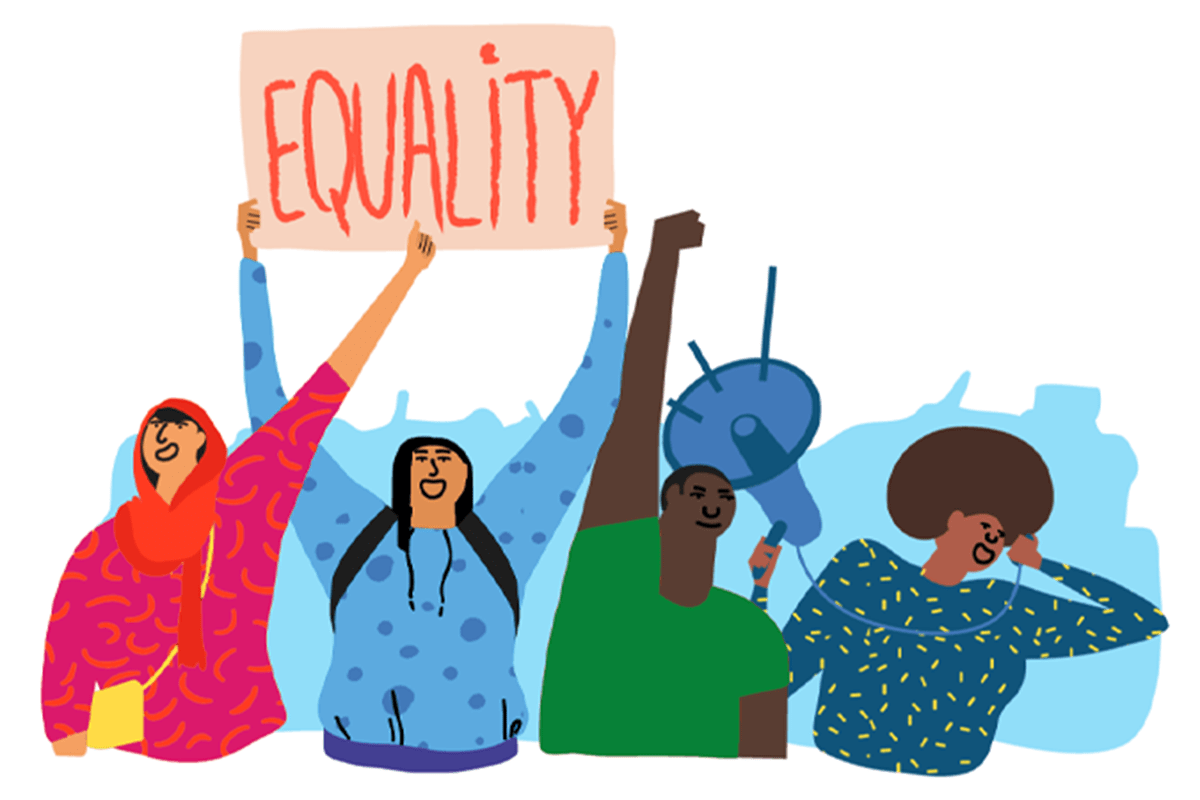Table of Contents
NEW CONCEPT OF EQUALITY
Introduction
Every human being is born equally and therefore the makers of the Indian constitution had also made the provision for equality of the people. Article 14 is one of the important articles of the Indian constitution.
Article 14 provides that ” the state shall not deny to any person equality before law or the equal protection of the laws within the territory of India”. Equality basically means access or provision of equal opportunities, where individuals are protected from being discriminated against.
The right to equality guaranteed under article 14 consists of 2 expressions namely, equality before law and equal protection of laws. Equality before laws means absence of any special privileges for any particular person. Equal protection of laws means subjection of equal laws applying to all in the same circumstances.
Test of Reasonable classification V. New concept of equality
All persons are not equal by their nature, attainment or circumstances. The varying needs of different classes of persons often require separate treatment. So for the society to progress, classification is important. Classification must be reasonable and not be arbitrary, artificial or evasive. Old concept of equality consists of two tests of classification namely, Intelligible Differentia and Rational Relation.
Intelligible Differentia :
The classification must be founded on an intelligible differentia which distinguishes those that are grouped together from other
Rational Relation :
The intelligible differentia must have a rational relation to the object sought to be achieved by the act.
The court is to examine the purpose and policy of the Act and then to discover whether the classification made by the law has a reasonable relation to the object which the legislature seeks to obtain. According to old concept of equality, if the classification is not reasonable , the legislation will be declared as unconstitutional. In other words if the law does not satisfy the two tests of classification, the law can be declared as unconstitutional.
According to the new concept of equality, even though the law satisfies the tests for valid classification and even though there is no discrimination among the similarly situated people, still the law can be declared as invalid and unconstitutional.
Facets Of New Concept Of Equality
The facets of the new concept of equality includes Arbitrariness, Unreasonableness and Non observance of principles of Natural Justice.
Arbitrariness
In E. P. Royappa v. State of Tamil Nadu, ( AIR 1974 SC 555), it has been observed that equality is antithetic to arbitrariness. In fact equality and arbitrariness are sworn enemies, one belong to the rule of law in the republic while the other to the whim of an absolute monarch.
In Maneka Gandhi v. Union Of India, (AIR 1978 SC 597), it has been observed that Article 14 strikes at arbitrariness in a state action and ensure fairness and equality of treatment.The principle of reasonableness is an essential element of Article 14.
In Air India v. Nargesh Meerza, ( AIR 1981 SCR 1 438), Regulation 46 of Airlines which provided for termination of service of air hostess on first her pregnancy was held to be extremely arbitrary and violate article 14 of the constitution.
Unreasonableness
Every decision of the state must be transparent and sound. What is unreasonable is violative of equality. Principles of reasonableness is an integral part of equality under article 14 of the Indian constitution. Wherever there is unreasonable exercise of power, there is negation of equality.
In Common Cause v. Union Of India, ( AIR 1996 SC 3538) the court invalidated the allotment of petrol pumps by petroleum minister out of his discriminatory quota because of unfairness and arbitrariness in such allotment for not following the guidelines and for the exercise of unfair and arbitrary action.
In Ramana Dayaram Shetty v International Airport Authority,( AIR 1979 SC 1628) it has been held that reasonableness in the state’s action has its source in article 14.
Non observance of Principles of Natural Justice
Principles of Natural Justice is an integral part of the governance of equality assured by Article 14. Principles of natural justice is a requirement of article 14. ‘ Audi alteram partem‘ is also a requirement of article 14 of the Indian Constitution.
In Union of India v. Tulsiram Patel, ( AIR 1985 SC 1416) the court has held that non observance of the principles of natural justice in the state action violates article 14.
In Central Inland Water Transport Corporation v. Brojonath Ganguly, ( AIR 1986 SC 1571), the court invalidated rule 9(1) of the corporation rules which provided for termination of service on the three months notice or on payment of three months salary in lieu of notice on the ground that rule 9(1) goes against principles of natural justice i.e., audi alteram partem.
Conclusion
Development of equality from old concept is the part of constitutional law. Development of equality ensures the growth of constitution. The new dimensions of Article 14 have been developed by the judiciary and the main purpose of Article 14 according to the new concept is to remove arbitrariness in the state’s action. Thus, the scope of Article 14 has been expanded by various judicial pronouncements .
According to the new concept of equality, even though the law satisfies the tests for valid classification and even though there is no discrimination among the similarly situated people, still the law can be declared as invalid and unconstitutional.
References:
- Jain M. P., Indian Constitutional Law, ( Lexis Nexis, Chennai, 8th edn., 2018).
- Shukla V. N., Constitution Of India, ( Eastern book company, Lucknow , 13th edn., 2019).
- Basu Durga Das, The Constitution Of India, ( Lexis Nexis, Chennai, 24th edn, 2019).
Author: Anirudh Rajeev Joshi,
KSLU's Law School 2021

